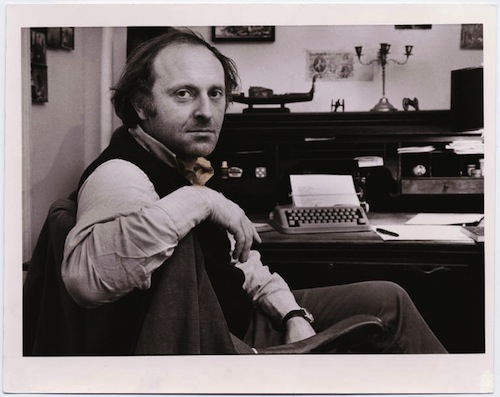The Anti-Soviet Soviet Poet: Joseph Brodsky
The New Yorker has been writing about Joseph Brodsky for some time now, as we've mentioned. Keith Gessen's original essay, which was partly a review of a new biography of Brodsky by his great friend and fellow émigré Lev Loseff, also shed some light on an unpublished poem Brodsky had written in the 1990s, "lamenting the splitting-off of Ukraine from Russia. . . . Brodsky read it aloud once, at Queens College in New York in 1994, but never again circulated the poem. Loseff describes it as 'the lone act in his life of self-censorship.'" Now, Gessen writes, in "A Note on Brodsky and Ukraine":
I’ve since received a note from Brodsky’s literary executor, Ann Kjellberg, mildly rebuking me for not pointing out the complex circumstances of the poem, both political and bibliographic. “A poem known only from private manuscripts and other unauthorized sources should perhaps not be taken as representing an author’s settled views,” she writes. “Dating and historical circumstances might also be borne in mind when considering an archival source. In the summer of 1992, for example, newly independent Ukraine declared administrative control over former Soviet nuclear capability on its territory, including 176 ICBMs. Perhaps somewhat inflaming circumstances, later reconsidered.”
This is entirely fair and true. Kjellberg also points out that the poem first received wide circulation, after Brodsky’s death, when it was republished by Ukrainian nationalists and cited as an instance of Brodsky’s extreme pro-Russian views.
Gessen notes the evident paradox in Brodsky being deemed pro-Russian. He was Jewish, was imprisoned and then forced out of his country, and was friends with Tomas Venclova, a Lithuanian poet whose country achieved independence from the Soviet Union in 1990-91. "But, like so many of the developments in the post-Soviet space, it was complicated":
Brodsky was a strongly anti-Soviet Soviet poet, but a Soviet poet nonetheless. His poems required a complex understanding of Russian. Soviet schools—the ones Brodsky hated so viscerally that he dropped out of them at an early age—taught people Russian. They taught them Russian in Almaty, and Tashkent, and Samarkand; in Tallinn, Riga, Vilnius; in Sevastopol, Lvov, and Kiev. Most of these places had been part of the Russian Empire, which the Soviets inherited; but the Soviets defended it (as the inheritors of the Austro-Hungarian and Ottoman Empires were unable to do), and they even expanded it. More people were learning Russian when Brodsky was writing his poems than had ever learned Russian before. How, as a Russian poet whose poems would famously resist translation, could one not be happy about that?
In the past few years, I’ve travelled to some of the places where Russian language and Russian culture were made part of the fabric of life long before Lenin arrived at Finland Station, and where Russian is now being rolled back, post-1991. Even though there is a strong argument to be made for federation; even though the local élites who are the most fervid proponents of independence do not always have most people’s best interests at heart; and even though there are many places whose quality of life has demonstrably worsened since the fall of the Soviet Union, it’s hard not to root for nations, and cultures, and languages that have long been subordinate to Moscow and Russian. At the same time, for a speaker of Russian and admirer of Russian culture, it is also hard not to be a little sad about it, too. These processes will take time, but in thirty years it’s possible that very few people will speak Russian on the streets of Almaty; the same may be true in fifty or a hundred years in Kiev, birthplace of Mikhail Bulgakov, and Odessa, hometown of Isaac Babel. Well, too bad for the Russians, you say, and I agree. People who can’t speak Russian will be less susceptible to Russian propaganda. But they will also be less susceptible to the poetry of Joseph Brodsky. “On Ukrainian Independence” was, in a serious sense, politically incorrect, and this is why Brodsky never published it. But it expressed a real and legitimate anguish, and it happens to be a great poem.
Read it all here.



